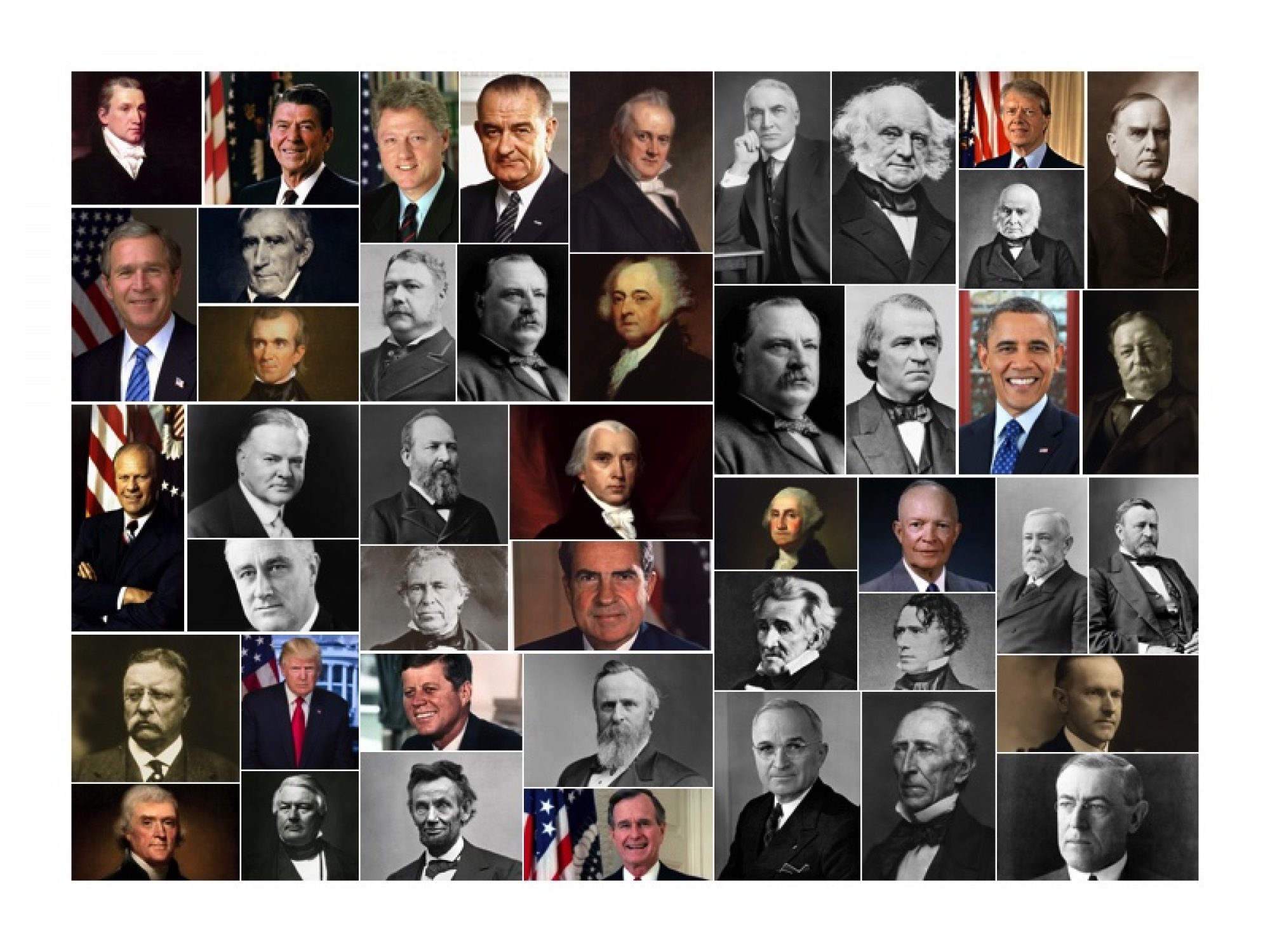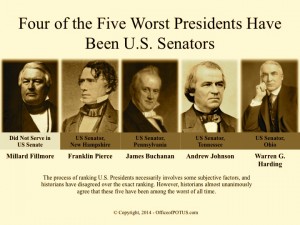Written By: Bradford J. Ham
With the 2014 midterm elections finally over, many potential 2016 presidential candidates are just weeks away from announcing their plans to run. The group of candidates will most likely include several current and former governors, senators, lawyers, Ivy League graduates, medical doctors, military officers, and diplomats. This is a very remarkable group to say the least. But what past experiences on a presidential candidate’s resumé, if any, are the best predictors for success or failure in the White House? A look back at the resumés of the forty-three men who have served as president provides us with some insight.
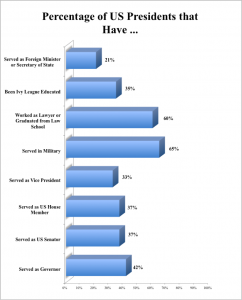
Although the forty-three men who have served as President are different from each other in many ways, there are many impressive commonalities that they share as a group. Over one-third have been Ivy League graduates, and almost two-thirds have served in the military in at least some capacity. Over forty percent have served as governor, over sixty percent have been lawyers, and over twenty percent have served as either secretary of state or U.S. foreign minister. Some past titles do not tell us much about how successful a person will be in the Oval Office. Others are more indicative.
Some of the best and worst presidents have been lawyers. John Adams and Abraham Lincoln are good examples of the former. Adams’ experience as a defense lawyer strengthened his belief in the right to counsel for criminal prosecutions. Abraham Lincoln and his cabinet of lawyers fought for legal equality for former slaves. However, Richard Nixon found himself using the law for self preservation, rather than national unity. Nixon, who graduated third in his class from Duke Law, employed shaky legal arguments to stall the Watergate investigation that eventually led to his resignation from office, and to justify executive overreach and political espionage.
The same is true for military service. Dwight Eisenhower‘s leadership as the Supreme Allied Commander during World War II provided him with the skills necessary to project strength abroad and, at the same time, create an era of peace and prosperity domestically. On the other hand, President Ulysses S. Grant, considered one of the best commanding generals of all time for his service during the American Civil War, is considered a lousy president because of his economic mismanagement and failure to end corruption in the federal government.
Similarly, service as governor, service as vice president, and service as foreign minister do not serve as great predictors for presidential success. There have been a roughly equal number of successful and unsuccessful presidents that have served in these roles. However, there is at least one past title on a presidential candidate’s rusumé that history tells us to be wary of: United States Senator.
There is a lot of evidence to suggest that former senators do not make the best presidents. Four of the five men that are consistently ranked as the worst Presidents of all time have been U.S. senators: Franklin Pierce, James Buchanan, Andrew Johnson, and Warren G. Harding (Millard Fillmore is the only president that is consistently ranked within the worst five who did not first serve as a senator). Additionally, none of the five men who are consistently ranked as the best five presidents have ever served in the US Senate: George Washington, Thomas Jefferson, Abraham Lincoln, Theodore Roosevelt, or Franklin Delano Roosevelt.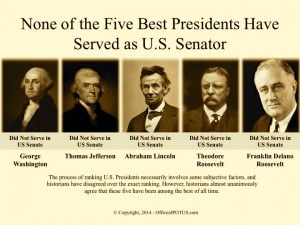
In addition to historical performance, there is also recent evidence to suggest that former senators are not as well-liked by their constituents as non-senator presidents. Gallup started keeping track of the presidential approval ratings when Harry Truman became president in 1945. Since Gallup began tracking, more Americans, on average, have approved of the job of non-senator presidents (average approval of 54%), than they have of the Presidents who served as senator (average approval of 49%) (Note: these numbers exclude John F. Kennedy and Gerald R. Ford because neither of them served a full term in office).
There are many theories as to why senators do not make the best presidents. One possible explanation is that that senators are often able to gain national name recognition and fame without having any legislative accomplishments or leadership experience. Senators can avoid controversial issues by refusing to take tough votes and by leaving the most controversial decisions to party leadership.
Perhaps the best example of a senator’s failure as president is Warren G. Harding. Before becoming president, Harding served as a United States senator from 1915 through 1921. During his tenure in the Senate, Harding essentially took no tough stances on any of the most important issues facing the country. When he first ran for the senate, he avoided talking about World War I out of fear that doing so would isolate German-Americans (a large voting block in his home state of Ohio). Once in office, Harding did not take a strong stance on most other major issues of the day: labor, women’s suffrage, or prohibition.
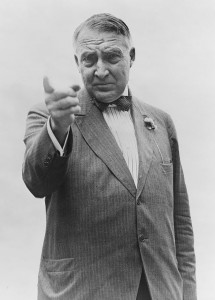
Despite Harding’s weak legislative record, he was able to gain national attention because of his great speaking skills, and his vocal opposition to then-President Woodrow Wilson. Harding adamantly spoke out against Wilson’s proposed “League of Nations”, calling Wilson a “partial dictator.” Harding’s harsh stance against the Democratic President helped him win the spot of Keynote Speaker during the 1916 Republican National Convention. Harding decided to run for President himself in 1920, promising a “return to normalcy” in America, after what he saw as the failed progressive policies that marked Wilson’s years in the White House. Voters did not seem to mind the fact that Harding himself did not serve as a leader on any piece of legislation or that Harding had a spotty attendance record in the senate during votes. Harding’s great oratory and opposition for the president were enough to get him into the Oval Office in 1921.
However, once in the Oval Office, Harding’s lack of leadership soon became evident for all to see and the country suffered greatly as a result. Harding, who never took a strong stance on Prohibition himself, drank socially in the White House during the time alcohol was banned throughout the country. In 1922 Harding was unable to quell tensions between railroad companies and workers, leading to a strike of 400,000 workers and violence between the union members and company guards. Eleven people were killed during that strike. Harding later lost control of his own administration officials, who were found guilty of taking bribes from oil companies seeking to receive low rates from government leased oil reserves, without competitive bidding. Harding is consistently ranked by Democratic and Republican scholars as one of the worst presidents in U.S. History.
The path that Harding took from the Senate to the White House is not uncommon in modern times. It is also not unique to one party or the other. President Obama, who had only been in the U.S. Senate for two years before launching his Presidential campaign and did not have many major legislative accomplishments, won the presidency partially because of his opposition to George W. Bush and his tremendous speaking skills. The same is true for many senate Republicans seeking the presidential nomination in 2016. Rand Paul, Ted Cruz, and Marco Rubio are seen as major contenders in the Republican nominating contest despite any major accomplishments or leadership experience in the Senate.
Does all of this mean that Hillary Clinton, Rand Paul, Elizabeth Warren, or Ted Cruz, all of whom have served in the senate, could never make a good president? Not at all. The forty three men that have been president do not provide us with a significant enough sample size to draw unalterable conclusions and there have been outliers. Andrew Jackson, America’s seventh president and former senator from Tennessee, is considered to be among the best President’s of all time and a strong leader. The same is true for Harry Truman, who had low approval ratings while in the White House, but who historians now consider among the top tier of past presidents. However, as people begin announcing their intentions to run in 2016, voters may want to think carefully before picking candidates with “U.S. Senator” as the only past experience on their resumé.
©Copyright, 2015 OfficeofPOTUS.com
